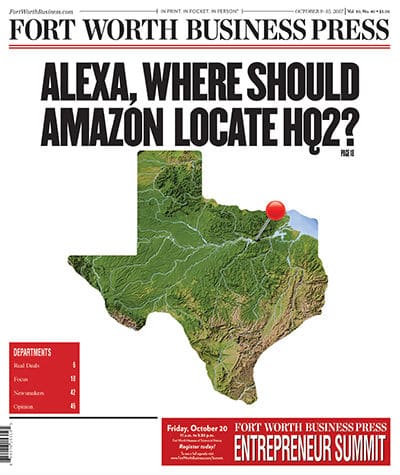Amazon abruptly dropped plans Feb. 14 for a big new headquarters in New York that would have brought 25,000 jobs to the city, reversing course after politicians and activists objected to the nearly $3 billion in tax breaks promised to what is already one of the world’s richest, most powerful companies.
“We are disappointed to have reached this conclusion – we love New York,” the online giant from Seattle said in a blog post announcing its withdrawal.
The stunning move was a serious blow to Gov. Andrew Cuomo and Mayor Bill de Blasio, who had lobbied intensely to land the project, competing against more than 200 other metropolitan areas across the continent that were practically tripping over each other to offer incentives to Amazon in a fierce bidding war the company stoked.
Texas could see some benefit from the change in plans.
The Seattle-based retailer and technology company on Dec. 11 announced plans to open a Regional Air Hub at the Fort Worth Alliance Airport, the first of its kind facility for Amazon Air. The facility is expected to create hundreds of jobs. And Austin could see an uptick in the number of Amazon jobs as the company said it plans to spread jobs planned for New York to other cities.
Democratic Rep. Alexandria Ocasio-Cortez, New York City’s new liberal firebrand, exulted over Amazon’s pullout.
“Today was the day a group of dedicated, everyday New Yorkers and their neighbors defeated Amazon’s corporate greed, its worker exploitation and the power of the richest man in the world,” she tweeted, referring to Amazon CEO Jeff Bezos.
The swift unraveling of the project reflected growing antipathy toward large technology companies among liberals and populists who accuse big business of holding down wages and wielding too much political clout, analysts said.
“This all of a sudden became a perfect test case for all those arguments,” said Joe Parilla, a fellow at the Brooking Institution’s Metropolitan Policy Project.
Amazon ultimately decided it did not want to be drawn into that battle.
Amazon announced in November that it had chosen the Long Island City section of Queens for one of two new headquarters, with the other in Arlington, Virginia. Both would get 25,000 jobs. A third site in Nashville, Tennessee, would get 5,000.
The company had planned to spend $2.5 billion building the New York office, choosing the area in part because of its large pool of tech talent.
The governor and the mayor had argued that Amazon would transform the neighborhood into a high-tech hub and spur economic growth that would pay for the $2.8 billion in state and city incentives many times over.
After Amazon’s change of heart, Cuomo complained that “a small group of politicians put their own narrow political interests above their community.” And the mayor criticized Amazon for not doing more to try to win over New Yorkers.
In pulling out of New York, Amazon said it isn’t looking for a replacement location “at this time.”
It said it plans to spread the technology jobs that were slated for New York to other offices around the U.S. and Canada, including Chicago, Toronto and Austin. It will also expand its existing New York offices, which already have about 5,000 employees.
Amazon faced fierce opposition over the tax breaks, with critics complaining that the project was an extravagant giveaway – or worse, a shakedown – and that it wouldn’t provide much direct benefit to most New Yorkers.
The list of grievances against the project grew as the months wore on, with critics complaining about Amazon’s stance on unions and some Long Island City residents fretting that the company’s arrival would drive up rents and other costs.
Construction industry groups and some local business leaders had urged the public and officials to get behind the plan.
A Quinnipiac University poll released in December found New York City voters supported having an Amazon headquarters 57 percent to 26 percent. But they were divided over the incentives: 46 percent in favor, 44 percent against.
Associated Press Writers Verena Dobnik, Karen Matthews, Kiley Armstrong in New York; Chris Rugaber in Washington; and Chris Carola and David Klepper in Albany, New York, contributed to this story. The FWBP Staff contributed as well.






